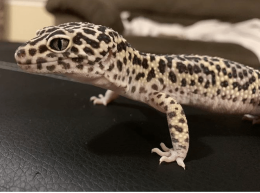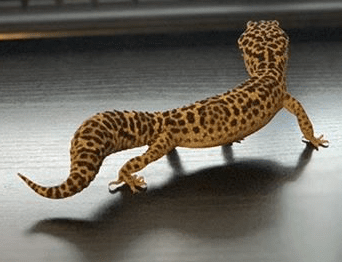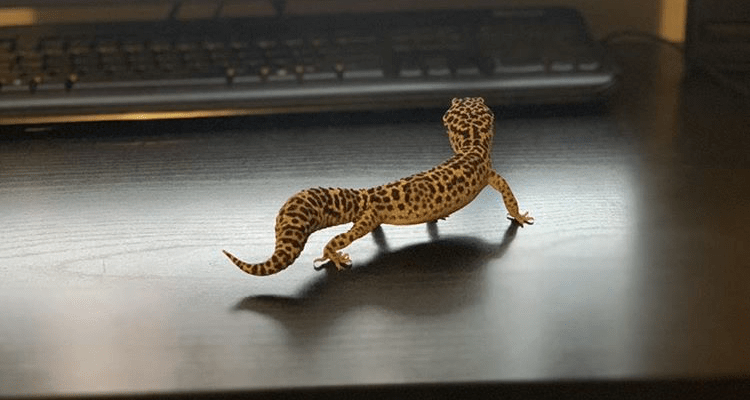In the wild, leopard geckos are prey, so they can understandably be nervous at times when you are around. It is useful to know the common ways that leopard geckos will display their anxiety, so you can take steps to making sure they are not unduly stressed or threatened.
If they display any of these behaviours, you should leave them alone for a while, and if this continues happening, you should invest some extra time into taming them and gaining their trust.
If this is the case, then take a look at my post on How to tame a leopard gecko
They hide away
If your leopard gecko is feeling threatened or scared, it is likely to retreat to one of its hides, or to a place which is well covered. When your gecko is hiding away, I would advise against trying to remove their hide unless it’s absolutely necessary, as doing so will further increase their stress levels

- Photo Credit: @venusllove (Instagram)
They wiggle or flick their tail
One of the key defence mechanisms leopard geckos have is to drop their tails if they perceive a very threatening life or death situation. If a gecko is grabbed by it’s tail, it can eject and run away to save its life with its body and vital organs intact. The tail can also be used as a decoy, to attract predators towards the tail rather than to their bodies, which is why they will wiggle or flick it. If your gecko is doing this, he/ she probably perceives you as a threat and it’s probably best to leave them alone and put them where they will feel safe and sheltered.
They make small noises
Leopard geckos have the ability to make small noises if they feel threatened. My female (my most anxious gecko) sometimes make noises that sound like mini gecko sneezes, which she will repeatedly do if she’s being handled, and I know to put her away at this point. My male will make a much louder noise which can be heard across the room, but strangely only when he’s sat in his vivarium, on top of his tallest hide. This baffles me, as there are no threats around him and he makes no other signals that he’s threatened. I guess they can vocalise in other situations other than feeling threatened… if you know more about this please drop a comment, as I’d love to know why he does this.
They won’t settle down
I usually find that if I have my geckos out, they will settle down in a comfortable and warm place quite happily, but on some days they are moving around very quickly, they won’t settle, and they will sometimes do a bit of tail flicking or noise making. If this is the case, I just accept that they don’t want to be around me today and put them back.

There are certain situations when my geckos display more of these behaviours. When they are about to shed, or just after a shed, they don’t want me anywhere near them. Also during the day, they are a lot less comfortable being handled, so I tend to avoid this unless I need to clean them, remove a dead locust, etc.
Baby geckos, or geckos who have just been introduced to a new vivarium/ enclosure are also more likely to be nervous as they have not settled into their surroundings yet. Be patient with them, and gradually introduce yourself to them after a few days, and this should help them feel more comfortable around you.
What do your leopard geckos do when they are stressed? Did I miss anything? I’d love to hear your comments and feedback!
Get Your Free Leopard Gecko Care Checklist!
Are you ready to give your leopard gecko the best care possible? Download our FREE PDF e-book featuring a comprehensive care checklist!
This handy guide covers everything from habitat setup to feeding and health tips, ensuring your gecko thrives.
👉 Download your checklist now!




